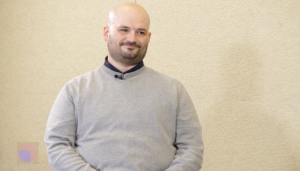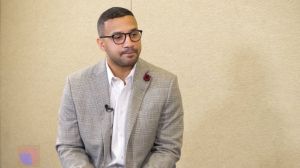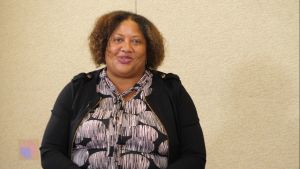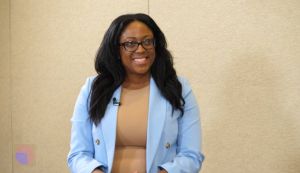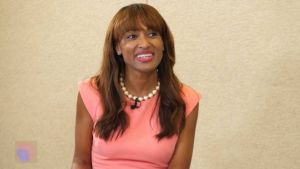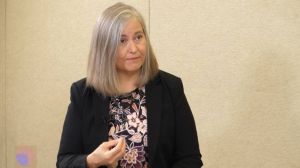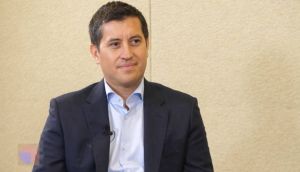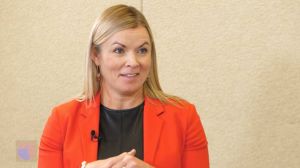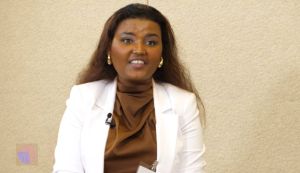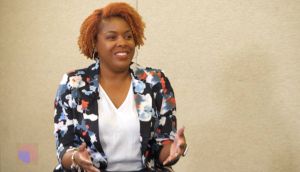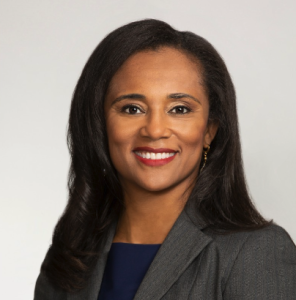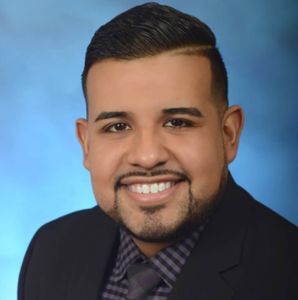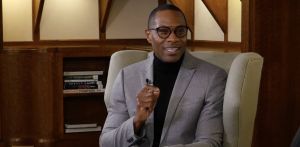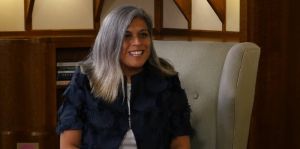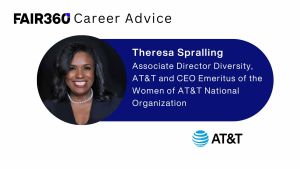Wells Fargo’s Lisa Stevens, Executive Vice President, Regional Banking Executive, Western Region, discusses the importance of community service, the power of positive thinking and embracing change.
Lisa Stevens, Executive Vice President, Regional Banking Executive, Western Region, has been at Wells Fargo for 27 years her entire career.
It wasn’t by design. She graduated college with the intention of becoming a journalist, specifically an investigative reporter. Lisa wanted to make the world a better place and she thought she could do so by getting information to people. In her junior year of college, she interned with Mike Wallace at 60 Minutes in Washington, D.C. She produced a story during that internship that aired a year later. Stevens recalled being “pretty excited about the whole concept and extremely altruistic.”
Stevens moved back to D.C. after graduating college to pursue a career with CBS. “They had a hiring freeze at the time, so I ended up working at a bank,” recalled Stevens. Six months into the job, Wells Fargo reached out and inquired if she wanted to be in business banking. Stevens had student loans so she took the job and moved back to California. Stevens still had hopes of being a journalist, however, and she pursued it. She worked at Wells during the day, and at night she was on the assignment desk for a local NBC affiliate.
Juggling the two jobs brought a revelation to Stevens: her true passion was helping people. Stevens realized that helping small businesses and coaching her associates brought excitement to her job. Stevens realized that this was her calling, her way to make the world a better place. “I ended up going around in Wells Fargo and having that same altruistic take, but my take was that I could make a difference in the world by helping our customers and by helping people that I worked with be better than they ever thought they could be by helping them and coaching them and showing them what they were capable of,” said Stevens. “I realized that so many people are so talented. They just need someone to believe in them and coach them and help them to be able to get there.”
By 1993, Stevens became a branch manager and her career rocketed from there. She became one of the first district managers in the company’s supermarket banking group and went on to manage multiple departments and geographies throughout the years. She’s now in charge of community banking in the Western U.S. and more than 30,000 team members.
We caught up with Stevens to get insights about Wells Fargo’s strong commitment to diversity and inclusion, as well career advice on how to become a high potential and the benefits of serving on a not-for-profit board.
Wells Fargo’s Commitment to Diversity and Inclusion Was Always Very Strong
“One of the things I remember when I first started at Wells Fargo was that there had been a major break-through because women were just able to wear pants. It had been a big deal and was a big win,” remembers Stevens.
“It was also very telling in terms of my start with Wells Fargo and the things I remembered. Having people with diverse backgrounds was really important to the company. The company made it very clear that we fostered having a diverse set of people that we work with who have different backgrounds and come from different perspectives. That was always the foundation of the organization and remains so to this day.”
Stevens also remembered the company having a stronger commitment to the community than any other company at the time. “From the very start of my career, there was a push for volunteerism, the importance of people going out into the community and helping,” she said.
She credits Wells Fargo for helping her understand the impact of being involved in the community. Getting involved in the community opened Stevens’ lens and exposed her to more.
“I truly believe that for me and for thousands of people who start their career at Wells Fargo, it’s a wonderful place to give you a foundation of appreciating what it can bring,” noted Stevens.
Community Service Has ‘Become Ingrained in Me and Has Rolled Over Into My Personal Life’
“It is sewn into Wells Fargo’s DNA, that we be involved in our communities and that in order for us to be successful, our communities have to thrive,” explained Stevens.
“It’s become ingrained in me and it has rolled over into my personal life. My children grew up in San Francisco for the first part of their lives and we were always involved in volunteering and in community events.”
She continued, “We also need to look at community service from a diversity lens standpoint. My children started volunteering and being involved when they were really young. They don’t have any biases or lens of biases and they’re so extremely open to everyone. I attribute that to the work that Wells Fargo did for me in my career in terms of getting me involved in the communities.”
Stevens noted that the community work is very fulfilling and people at Wells Fargo get to make a difference.
“When you’re working with a non-profit and you get to see that you’re able to help other people and you’re able to make a difference, it’s extremely powerful. It’s a privilege and an honor to get to be able to serve and help the non-profit community.”
The Power of Positive Thinking and Embracing Change
Mentors and sponsors have had a significant impact on Stevens’ career. In particular, she learned two very important life lessons from her mentors.
Stevens talked about a mentor who taught her about the power of positive thinking. The mentor told Stevens that she could always decide how she wanted to respond to things.
She explained, “My mentor’s message to me was that I may not get to control the changes that are going to happen but what I have is the chance to respond with a positive attitude. She said I could look at the situation and say, ‘How can this make us better, what gifts can we get out of this.'”
Stevens noted that it was one of the largest impacts early on in her career. She said that the same mentor also taught her to embrace change.
“So many people fight change and she gave me a different perspective of if change is going to happen, and there’s nothing you can do about it, you can either fight it or you can embrace it. You have to find a way that you can believe in the changes that are happening and then embrace them,” said Stevens.
“Being able to embrace change was a big reason why I was able to have success in my career.”


